MS Book and Mineral Company
Geological Society of America Publications
For newer GSA Memoirs - Scroll down
For older GSA Catalogs - click here:
Special Papers
Field Guides and Reviews of Engineering Geology
Our regular stock of older GSA Publications
GSA DNAG (Decade of North American Geology) Publications
Home Page
Contact information
Fossil Specimens
Mineral Specimens
Place an Order
Sale
Mining History Illustrations
When you purchase items (books, maps, fossils, minerals, folios) on this website, these discounts are now in effect:
If your order totals $50, take 10% off the total + shipping
If your order totals $100, take 15% off the total + shipping
If your order totals $200, take 20% off the total + shipping
If your order totals $300, take 25% off the total, + shipping
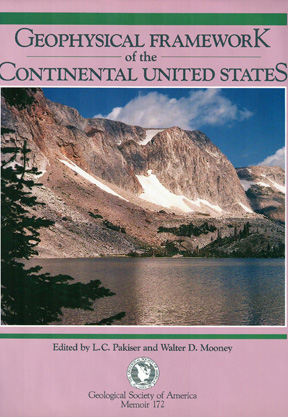
Memoir 172 - Geophysical Framework of the Continental United States
Description:
Pakiser, L. C. and Mooney, W. D. / GEOPHYSICAL FRAMEWORK OF THE CONTINENTAL UNITED STATES, Boulder, 1989, cl, 826 pages, - 1 -, $ 30
The authors are leading U.S.G.S. seismologists who for decades have notably contributed to solid earth geophysics. In this volume they have produced a comprehensive review and evaluation of our knowledge of the structure of the crust and upper mantle of the continental United States, exclusive of Alaska, as determined from geophysical observations. This is a valuable background source for research on the structure, composition, and geologic evolution of the continental crust and upper mantle. With 840 pages and 3 foldout plates, it makes an excellent self-contained coursebook presenting: the geophysical methods of studying the crust and upper mantle; a region-by-region review of crustal and upper-mantle structure; continental overviews based on the different geophysical methods; and geologic and petrologic syntheses based largely on the geophysical results. The authors are from universities, government agencies, and research institutions.
Contents:
Seismic methods for determining earthquake source parameters and lithospheric structure, Walter D. Mooney
Gravity methods in regional studies, Robert W. Simpson and Robert C. Jachens
Crustal studies using magnetic data
Paleomagnetic methods
Electrical structure of the crust and upper mantle beneath the United States, Part 1, Methods for determining the conductivity profile
Laboratory techniques for determining seismic velocities and attenuations, with applications to the continental lithosphere
The crustal structure of the western continental margin of North America
Regional crustal structure and tectonics of the Pacific Coastal States, California, Oregon, and Washington
Tectonic evolution of the Intermontane System; Basin and Range, Colorado Plateau, and High Lava Plains
Geophysics of the western Basin and Range province
Geophysical and tectonic framework of the eastern Basin and Range-Colorado Plateau-Rocky Mountain transition
Geophysics of the Intermontane system
Crustal structure of the Rocky Mountain region
Crustal structure of the continental interior
Geophysical framework of the Appalachians and adjacent Grenville Province
Atlantic and Gulf of Mexico continental margins
A crust/mantle structural framework of the conterminous United States based on gravity and magnetic trends
Isostatic residual gravity and crustal geology of the United States
Electrical structure of the crust and upper mantle beneath the United States; Part 2, Survey of data and interpretation
Paleomagnetism of North America; The craton, its margins, and the Appalachian Belt
Paleomagnetism of continental North America, Implications for displacement of crustal blocks within the Western Cordillera, Baja California to British Columbia
Heat flow and thermal regimes in the continental United States
Tectonic stress field of the continental United States
Earthquakes, faults, and the seismotectonic framework of the contiguous United States
Crustal structure of the western U.S. based on reflection seismology
Reflection seismic studies of crustal structure in the eastern United States
Seismic properties of the crust and uppermost mantle of the conterminous United States and adjacent Canada
Upper-mantle velocity structure in the continental U.S. and Canada
Composition of the continental crust and upper mantle; A review
Crustal geologic processes of the United States, more....
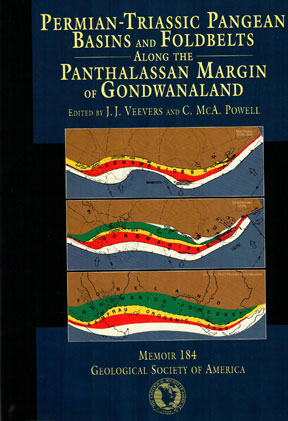
Memoir 184 - Permian-Triassic Pangean Basins and Foldbelts along the Panthalassan Margin of Gondwanaland,
Description:
Veevers, J. J. and Powell, C. McA., Ed. / PERMIAN-TRIASSIC PANGEAN BASINS AND FOLDBELTS ALONG THE PANTHALASSAN MARGIN OF GONDWANALAND, GSA M 184, Boulder, 1994, cl, 368 pages, - 3 -, $ 20
The 12,500 km margin of Gondwanaland from Argentina to eastern Australia subsided during synchronous stages of Pangean extension and diachronous Panthalassan subduction that formed a foreland basin (Du Toit's "Gondwanide foredeep") by craton-ward thrusting of a foldbelt/magmatic arc ("Samfrau Orogenic Zone"). After reconstructing Permian-Triassic Gondwanaland, authors writing on South America, South Africa, Antarctica, and Australia profusely illustrate the relevant geology of each sector in maps and time-space diagrams underpinned by robust biostratigraphic and radiometric dating. The work is then drawn together in a stratigraphic-tectonic synthesis, which features the specifically Gondwanan glaciogene and coal facies, the Early and Middle Triassic coal gap, and the interplay of Pangean and Panthalassan tectonics.
Contents:
Introduction
Reconstruction of the Panthalassan Margin of Gondwanaland
Eastern Australia
Permian-Triassic Transantarctic Basin
Southern Africa: Karoo Basin and Cape Fold Belt
Southern South America
Synthesis
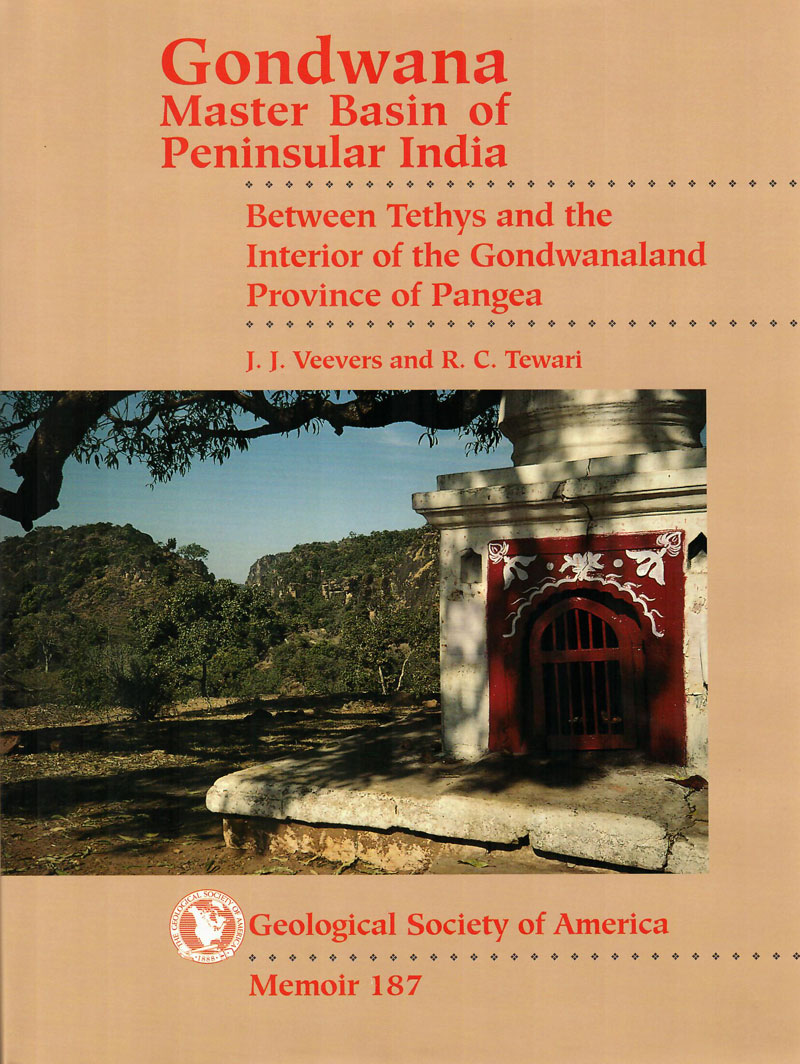
M 187 - Gondwana Master Basin of Peninsular India between Tethys and the Interior of the Gondwanaland Province of Pangea
Description:
Veevers, J. J. and Tewari, R. C. / GONDWANA MASTER BASIN OF PENINSULAR INDIA: BETWEEN TETHYS AND THE INTERIOR OF THE GONDWANALAND PROVINCE OF PANGEA, GSA M 187, Boulder, 1995, cl, 72 pages, - 1 -, $ 20
The Gondwana master basin grew during Permian and Triassic time on Precambrian basement between the Tethyan margin and interior rebound. Coal measures accumulated in valleys between growing faults. The Triassic succession lacked coal, except for coaly shale deposited in valleys renewed by Late Triassic Pangean rifting. Deposition ended during an Early Jurassic phase of intense transpression that dismembered the lobate master basin into individual structural basins. The basin lay 1000 km inboard of the passive, locally volcanic, margin of Tethyan Gondwanaland in a 10,000-km-wide radial drainage system that focused on an upland in conjugate East Antarctica. The basin evolved through interplay of the Gondwanan climate and biota with the Pangean tectonics of latest Carboniferous initial subsidence, Late Triassic rifting of and anisotropic basement, Early Jurassic internal dismemberment, and Late Jurassic and Early Cretaceous breakup.
Contents:
Pre-Gondwanan History
Succession of the Gondwana Master Basin
Paleogeographic Synthesis
Connections with Tethys and Gondwanaland
Connections Between India, Antarctica, Australia, and Africa
Pangean Tectonics and Stratigraphy
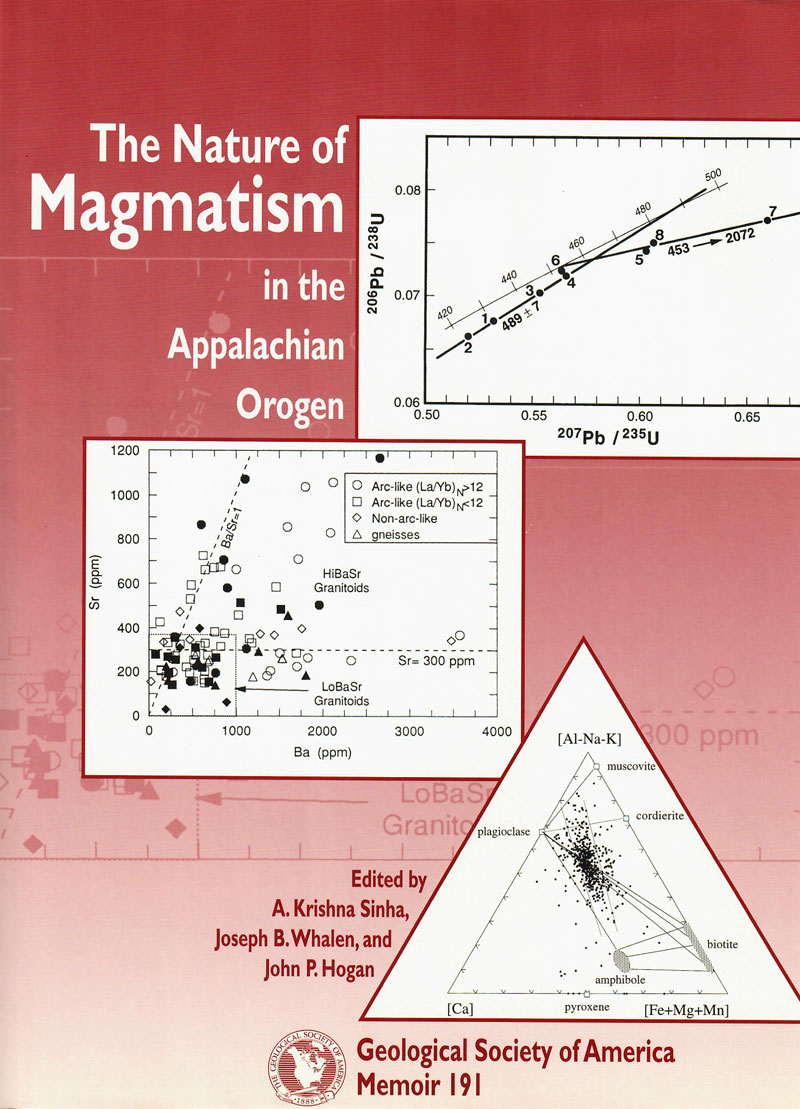
Memoir 191 - Nature Magnatism in the Appalachian Orogen
Description:
Sinha, A. K., Whalen, J. B., and Hogan, J. P. / THE NATURE OF MAGMATISM IN THE APPALACHIAN OROGEN, GSA M 191, Boulder, 1997, cl, 429 pages, - 1 -, $ 30
The thermal evolution of mountain belts is commonly recorded in the distribution, origin, and ages of magmatism. In this volume, 20 contributors present the latest petrologic, isotopic, and geochemical evidence to highlight the contribution of igneous rocks to the evolution of the Appalachian orogen in both Canada and the United States. These papers emphasize the use of modern geochemical and petrologic data to discriminate the sources yielding magmas, and thus the nature of the crust and mantle. The wealth of data available in this work provides a significant steppingstone to more rigorous interpretation of the assembly and origin of the Appalachian orogen.
Contents:
1. The Northeast Kingdom Batholith, Vermont: Geochronology and Nd, O, Pb, and Sr isotopic constraints on the origin of Acadian granitic rocks
2. The Spruce Head composite pluton: An example of mafic to silicic Salinian magmatism in coastal Maine, northern Appalachians
3. Late Precambrian plutons in the Avalon terrane of New Brunswick, Nova Scotia, and Newfoundland
4. Geochemistry and petrogenesis of tonalite dikes in the Smith River allochthon, south-central Virginia
5. Fractionation and contamination of Maquereau Group lavas, southern Gaspé, Québec Appalachians
6. Late Devonian mafic-felsic magmatism in the Meguma Zone, Nova Scotia
7. Rift and ocean floor volcanism from the Late Proterozoic and early Paleozoic of the Vermont Appalachians
8. Igneous petrogenesis and tectonic setting of granitic rocks from the eastern Blue Ridge and Inner Piedmont Alabama Appalachians
9. ND and SR isotopic characterization of crystalline rocks from the southern Appalachian Piedmont and Blue Ridge, North and South Carolina
10. Age and origin of the Austell Gneiss, western Georgia Piedmont-Blue Ridge, and its bearing on the ages of orogenic events in the southern Appalachians
11. Space-time composition relationships among Appalachian-cycle plutonic suites in Newfoundland
12. Concord plutonic suite: Pre-Acadian gabbro-syenite intrusions in the southern Appalachians
13. Low-potassium, trondhjemitic to granodioritic plutonism in the eastern Blue Ridge, southwestern North Carolina-northeastern Georgia
14. Tectonic influence on Late Proterozoic Avalonian magmatism: An example from the Greendale complex, Antigonish Highlands, Nova Scotia, Canada
15. Igneous and metamorphic U-Pb zircon ages from the Baltimore mafic complex, Maryland Piedmont
16. Elemental composition of the Alleghanian granitoid plutons of the southern Appalachians
17. Chemical variation in plutonic rocks caused by residual melt migration: Implications for granite petrogenesis
18. Magmatic and tectonic evolution of the Cambrian-Ordovician Laurentian margin of Iapetus: Geochemical and isotopic constraints from the Notre Dame subzone, Newfoundland
19. Implications of granitoid geochemical and isotopic data from the Cambrian-Ordovician Notre Dame arc for the evolution of the Central Mobile belt, Newfoundland Appalachians
20. The Cadillac Mountain intrusive complex, Maine: The role of shallow-level magma chamber processes in the generation of A-type granites
Index
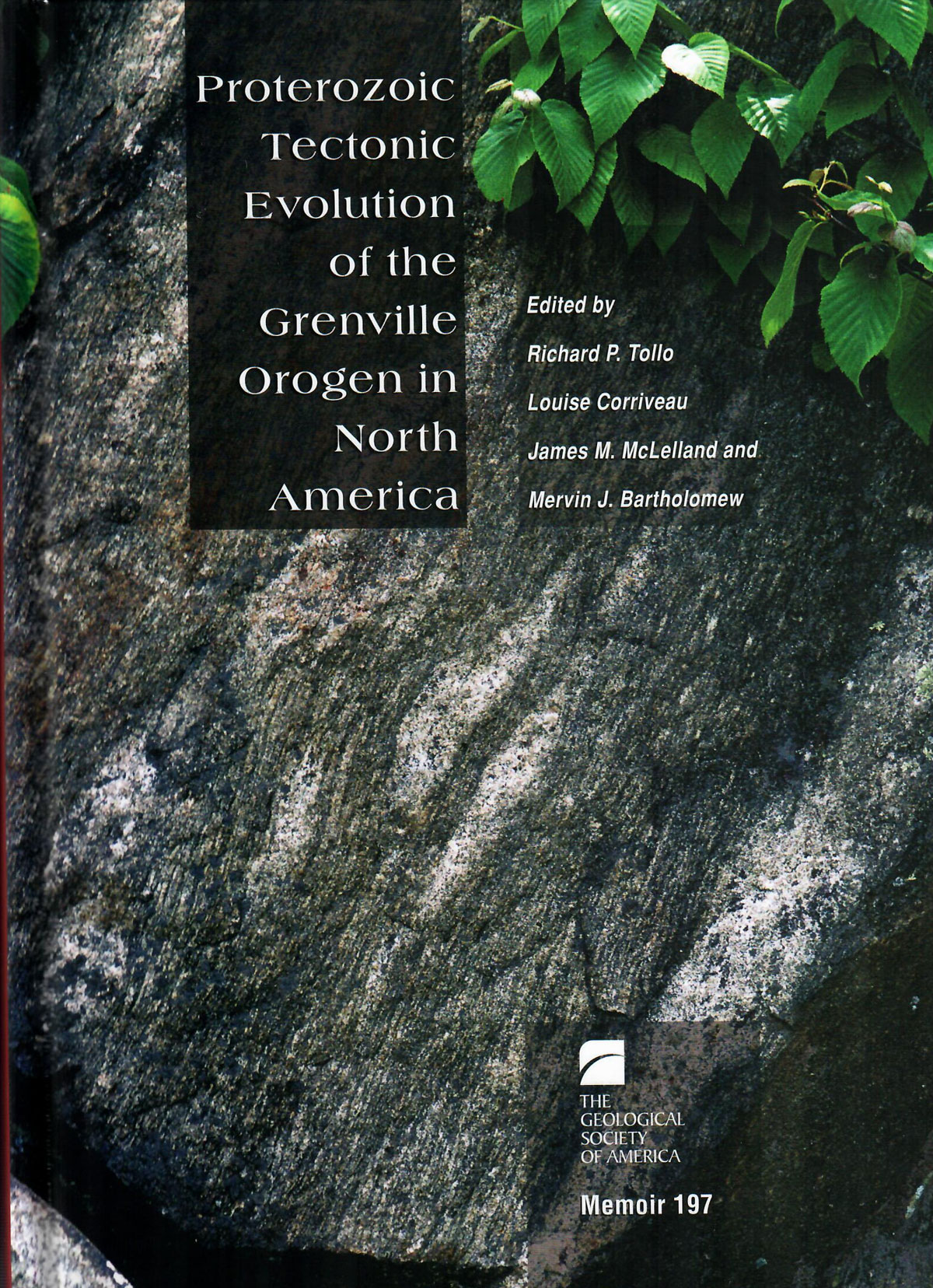
M 197 - Proterozoic Tectonic Evolution of the Grenville Orogen in North America
Description:
Tollo, R. P., et.al., Ed. / PROTEROZOIC TECTONIC EVOLUTION OF THE GRENVILLE OROGEN IN NORTH AMERICA, GSA M 197, Boulder, 2004, cl, 820 pages, - 1 -, $ 30
The geological evolution of the Grenville orogenic belt represents one of the most widespread episodes of crustal modification in Earth’s history. The 39 papers in this volume offer a system-wide perspective on rocks and processes of the Mesoproterozoic Grenville orogen and Appalachian inliers and include many multidisciplinary studies presenting results from integrated petrologic, geochemical, and geochronologic investigations. The volume includes contributions concerning the Grenvillian geology of Canada, the United States, and Mexico, focusing on both the tectonic evolution of the orogen and on innovative approaches to deciphering the igneous, metamorphic, structural, and metallogenic history of Mesoproterozoic assembly and Neoproterozoic rifting. The timing and regional correlation of events and processes is emphasized in order to bridge knowledge gaps within the orogen and to better understand the geodynamic framework.
Contents:
Canadian Grenville Province
Cordierite-orthopyroxene white gneiss: A key to unveiling premetamorphic hydrothermal activity in the Bondy gneiss complex, Grenville Province, Québec
Granulite-facies P-T-t paths and the influence of retrograde cation diffusion during polyphase orogenesis, western Grenville Province, Québec
Mesoproterozoic basement of the Lac St. Jean Anorthosite Suite and younger Grenvillian intrusions in the Saguenay region, Québec: Structural relationships and U-Pb geochronology
Low-variance sapphirine-bearing assemblages from Wilson Lake, Grenville Province of Labrador
High-pressure granulites in the Grenvillian Grand Lake thrust system, Labrador: Pressure-temperature conditions and tectonic evolution
Neoproterozoic juvenile crust development in the peri-Rodinian ocean: Implications for Grenvillian orogenesis
A Ni-Cu-Co-PGE massive sulfide prospect in a gabbronorite dike at Lac Volant, eastern Grenville Province, Québec
Oxygen-isotope constraints on terrane boundaries and origin of 1.18–1.13 Ga granitoids in the southern Grenville Province
L-S shape fabrics in the Mazinaw domain and the issue of northwest-directed thrusting in the Composite Arc Belt, southeastern Ontario
Early Mesoproterozoic tectonic history of the southwestern Grenville Province, Ontario: Constraints from geochemistry and geochronology of high-grade gneisses
SHRIMP U-Pb zircon geochronology of the Bondy gneiss complex: Evidence for circa 1.39 Ga arc magmatism and polyphase Grenvillian metamorphism in the Central Metasedimentary Belt, Grenville Province, Québec
Adirondack Massif
Unraveling growth history of zircon in anatectites from the northeast Adirondack Highlands, New York: Constraints on pressure-temperature-time paths
Deformation of the Diana syenite and Carthage-Colton mylonite zone: Implications for timing of Adirondack Lowlands deformation
Slow cooling and apparent tilting of the Adirondack Lowlands, Grenville Province, New York, based on 40Ar/39Ar ages
Petrogenesis of prismatine-bearing metapelitic gneisses along the Moose River, west-central Adirondacks, New York
SHRIMP U-Pb zircon geochronology of the anorthosite-mangerite-charnockite-granite suite, Adirondack Mountains, New York: Ages of emplacement and metamorphism
Right lateral oblique slip movements followed by post-Ottawan (1050–1020 Ma) orogenic collapse along the Carthage-Colton shear zone: Data from the Dana Hill metagabbro body, Adirondack Mountains, New York
Magmatic-hydrothermal leaching and origin of late to post-tectonic quartz-rich rocks, Adirondack Highlands, New York
Exhumation of a collisional orogen: A perspective from the North American Grenville Province
Appalachian Inliers
Deciphering multiple Mesoproterozoic and Paleozoic events recorded in zircon and titanite from the Baltimore Gneiss, Maryland: SEM imaging, SHRIMP U-Pb geochronology, and EMP analysis
Geochemical stratigraphy and petrogenesis of the Catoctin volcanic province, central Appalachians
Detrital zircon ages and Nd isotopic data from the southern Appalachian crystalline core, Georgia, South Carolina, North Carolina, and Tennessee: New provenance constraints for part of the Laurentian margin
Tectonic evolution of the northern Blue Ridge massif, Virginia and Maryland
Mesoproterozoic and Paleoproterozoic crustal growth in the eastern Grenville Province: Nd isotope evidence from the Long Range inlier of the Appalachian orogen
Geochemistry of the Late Mesoproterozoic Mount Eve granite suite: Implications for Late to post-Ottawan tectonics in the New Jersey–Hudson Highlands
Paleozoic structure of internal basement massifs, southern Appalachian Blue Ridge, incorporating new geochronologic, Nd and Sr isotopic, and geochemical data
Geology and geochemistry of granitic and charnockitic rocks in the central Lovingston massif of the Grenvillian Blue Ridge terrane
Compositional zoning of a Neoproterozoic ash-flow sheet of the Mount Rogers Formation, southwestern Virginia Blue Ridge, and the aborted rifting of Laurentia
Nd isotopic constraints on the magmatic history of the Goochland terrane, easternmost Grenvillian crust in the southern Appalachians
U-Pb geochronology and geochemistry of a portion of the Mars Hill terrane, North Carolina–Tennessee: Constraints on origin, history, and tectonic assembly
Pre-Appalachian tectonic evolution of the Pine Mountain window in the southernmost Appalachians, Alabama and Georgia
Petrologic and geochronologic evolution of the Grenville orogen, northern Blue Ridge Province, Virginia
Deciphering the Grenville of the southern Appalachians through evaluation of the post-Grenville tectonic history in northwestern North Carolina
Mesoproterozoic rocks of the New Jersey Highlands, north-central Appalachians: Petrogenesis and tectonic history
U-Pb geochronology and evolution of Mesoproterozoic basement rocks, western Connecticut
Texas and Mexico
U-Pb geochronology and Pb isotopic compositions of leached feldspars: Constraints on the origin and evolution of Grenville rocks from eastern and southern Mexico
U-Pb and 40Ar/39Ar constraints on the cooling history of the northern Oaxacan Complex, southern Mexico: Tectonic implications
Tectonic evolution of the eastern Llano uplift, central Texas: A record of Grenville orogenesis along the southern Laurentian margin
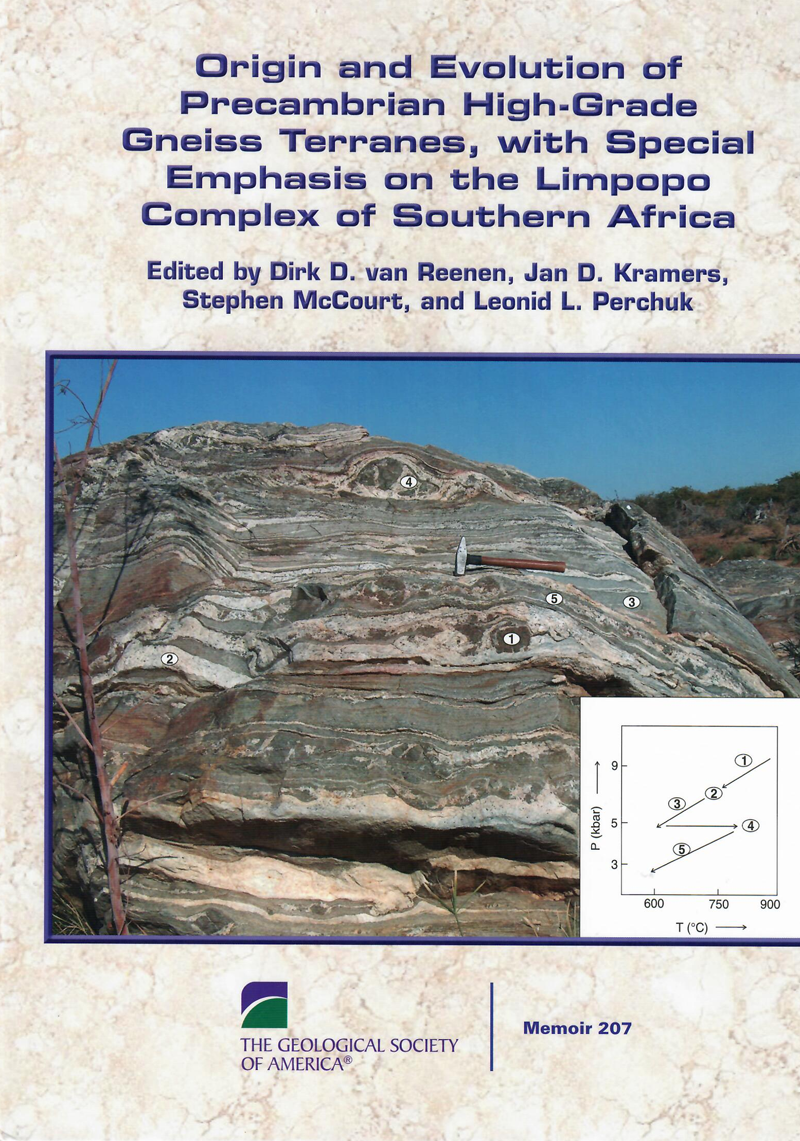
Memoir 207 - Origin and Evolution of Precambrian High-Grade Gneiss Terranes, with Special Emphasis on the Limpopo Complex of Southern Africa
Description:
van Reeden, D. D. / ORIGIN AND EVOLUTION OF PC HITH-GRADE GNEISS TERRANES, WITH SPECIAL EMPHASIS ON THE LIMPOPO COMPLEX OF SOUTHERN AFRICA, GSA Memoir 207, Boulder, 2011, cl, 324 pages, - 1 -, $ 30
Many early Precambrian high-grade metamorphic provinces differ subtly from more recent ones, with higher temperatures at shallower depth in the crust. This may in part be attributed to higher crustal heat production. The question of what else might have been different presents a challenge, as the control “everything else being equal” is removed from the experiment. The first section of Memoir 207 deals with mineralogic and petrologic aspects of high-grade metamorphism, including melting and the nature of fluids. Chapters 6 to 13 focus on the Limpopo Complex of southern Africa, with case studies and reviews of its geochronology and crustal evolution, and of the regional structural and burial-exhumation history. Problems of unraveling the effects of successive tectonometamorphic events in a polymetamorphic province are addressed from the geochronologic and the petrologic perspectives. The last two chapters include numerical simulations of lower crustal diapirism in high-grade metamorphism, and a review of tectonic models for the Limpopo Complex. This well-rounded book is relevant to the big question of uniformitarianism in plate tectonics and its effects.
Contents:
1. Microstructures of melt-bearing regional metamorphic rocks
2. Petrological and experimental application of REE- and actinide-bearing accessory minerals to the study of Precambrian high-grade gneiss terranes
3. Fluids in granulites
4. Fluid-absent melting versus CO2 streaming during the formation of pelitic granulites: A review of insights from the cordierite fluid monitor
5. Local mineral equilibria and P-T paths: Fundamental principles and applications to high-grade metamorphic terranes
6. The geochronology of the Limpopo Complex: A controversy solved
7. High-pressure and ultrahigh-temperature metamorphism of Precambrian high-grade terranes: Case study of the Limpopo Complex
8. Granite emplacement and the retrograde P-T-fluid evolution of Neoarchean granulites from the Central Zone of the Limpopo Complex
9. Intracrustal radioactivity as an important heat source for Neoarchean metamorphism in the Central Zone of the Limpopo Complex
10. A review of Sm-Nd and Lu-Hf isotope studies in the Limpopo Complex and adjoining cratonic areas, and their bearing on models of crustal evolution and tectonism
11. Thrust exhumation of the Neoarchean ultrahigh-temperature Southern Marginal Zone, Limpopo Complex: Convergence of decompression-cooling paths in the hanging wall and prograde P-T paths in the footwall
12. Neoarchean to Paleoproterozoic evolution of the polymetamorphic Central Zone of the Limpopo Complex
13. Archean magmatic granulites, diapirism, and Proterozoic reworking in the Northern Marginal Zone of the Limpopo Belt
14. Heterogeneous strain and polymetamorphism in high-grade terranes: Insight into crustal processes from the Athabasca Granulite Terrane, western Canada, and the Limpopo Complex, southern Africa
15. Formation and evolution of Precambrian granulite terranes: A gravitational redistribution model
16. Tectonic models proposed for the Limpopo Complex: Mutual compatibilities and constraints
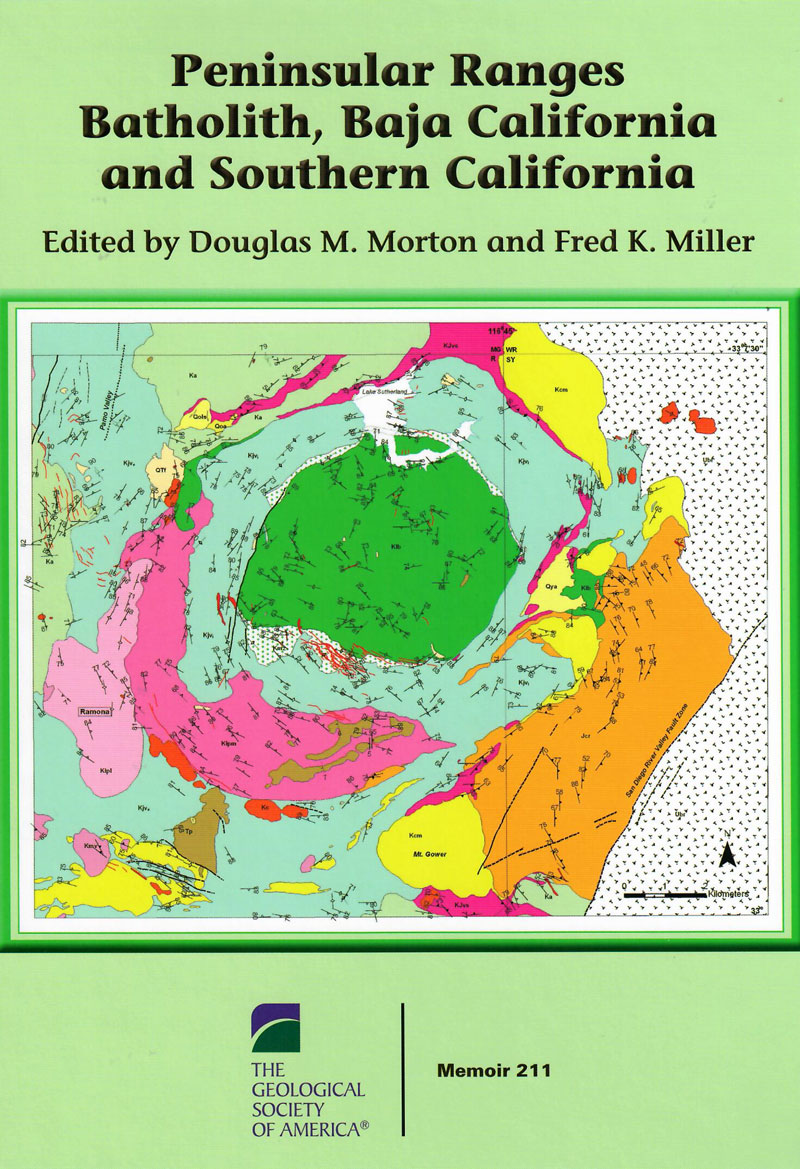
Memoir 211 - Peninsular Ranges Batholith, Baja and Southern California
Morton, D. M. and Miller, F. K., Ed. / PENINSULAR RANGES BATHOLITH, BAJA CALIFORNIA AND SOUTHERN CALIFORNIA, GSA Memoir 211, 2014, cl, 758 pages, - 1 -, $ 30
The Peninsular Ranges batholith is the southern part of the Cretaceous magmatic arc that extends over 1500 km from northern California to the tip of Baja California. The emphasis of this volume is on the more completely exposed northern 600 km of the Peninsular Ranges batholith. Petrology, geochronology, and regional aspects of individual plutons, as well as evolution of part of the overall batholith are discussed in the 24 chapters. A number of chapters deal with geophysical, chemical, and isotopic interpretations of the genesis and evolution of the batholith. A CD-ROM containing detailed color maps and a wealth of chemical, isotopic, mineralogic, and physical properties data is included.
Contents:
1. Geophysical framework of the Peninsular Ranges batholith—Implications for tectonic evolution and neotectonics
2. Age and isotopic systematics of Cretaceous borehole and surface samples from the greater Los Angeles Basin region: Implications for the types of crust that might underlie Los Angeles and their distribution along late Cenozoic fault systems
3. Framework and petrogenesis of the northern Peninsular Ranges batholith, southern California
4. U-Pb zircon geochronology of plutonism in the northern Peninsular Ranges batholith, southern California: Implications for the Late Cretaceous tectonic evolution of southern California
5. Potassium-argon cooling ages in the northern part of the Peninsular Ranges batholith and offsets on the Elsinore and San Jacinto fault zones
6. Thermochronology of Cretaceous batholithic rocks in the northern Peninsular Ranges batholith, southern California: Implications for the Late Cretaceous tectonic evolution of southern California
7. Pb-Sr-Nd-O isotopic characterization of Mesozoic rocks throughout the northern end of the Peninsular Ranges batholith: Isotopic evidence for the magmatic evolution of oceanic arc–continental margin accretion during the Late Cretaceous of southern California
8. Low-initial-Sr felsic plutons of the northwestern Peninsular Ranges batholith, southern California, and the role of mafic-felsic magma mixing in continental crust formation
9. Santiago Peak volcanics: Early Cretaceous arc volcanism of the western Peninsular Ranges batholith, southern California
10. Petrology and chemistry of the Green Acres gabbro complex near Winchester, Riverside County, California
11. Lakeview Mountains pluton: A dynamically emplaced pluton, northern Peninsular Ranges batholith, southern California
12. A study of sampling requirements to determine modal variability within the Lakeview Mountains pluton, northern Peninsular Ranges batholith, southern California
13. Subduction transitioning from beneath oceanic crust to beneath continental crust, northern Peninsular Ranges batholith: Structural and thermal imprint on prebatholithic rocks
14. SHRIMP-RG U-Pb ages of provenance and metamorphism from detrital zircon populations and Pb-Sr-Nd signatures of prebatholithic metasedimentary rocks at Searl Ridge, northern Peninsular Ranges batholith, southern California: Implications for their age, origin, and tectonic setting
15. A west-to-east geologic transect across the Peninsular Ranges batholith, San Diego County, California: Zircon evidence for the mixing of crustal- and mantle-derived magmas, and comparisons with the Sierra Nevada batholith . . . . . . . . . . . . . . . . . . . . . . . . . . . .
16. Mineralogy and physical properties of plutonic and metamorphic rocks of the Peninsular Ranges batholith, San Diego County, California
17. The zoned Ramona plutonic complex: An Early Cretaceous mid- to upper-crustal intrusive sequence, Peninsular Ranges batholith, southern California
18. The Rattlesnake Valley and Oriflamme Canyon plutons: Key temporal markers in the Jurassic and Cretaceous development of the transition zone of the Peninsular Ranges batholith
19. Upper Jurassic Peñasquitos Formation—Forearc basin western wall rock of the Peninsular Ranges batholith
20. Mesozoic tectonic evolution of the southern Peninsular Ranges batholith, Baja California, Mexico: Long-lived history of a collisional segment in the Mesozoic Cordilleran arc
21. Tectonic implications of postcontractional magmatism of the Alisitos arc segment of the Peninsular Ranges, Baja California, Mexico
22. Structural evidence for mid-Cretaceous suturing of the Alisitos arc to North America from the Sierra Calamajue, Baja California, Mexico
23. A paleomagnetic transect of the mid-Cretaceous Peninsular Ranges batholith, Baja California, Mexico
24. The Sierra San Pedro Mártir zoned pluton, Baja California, Mexico
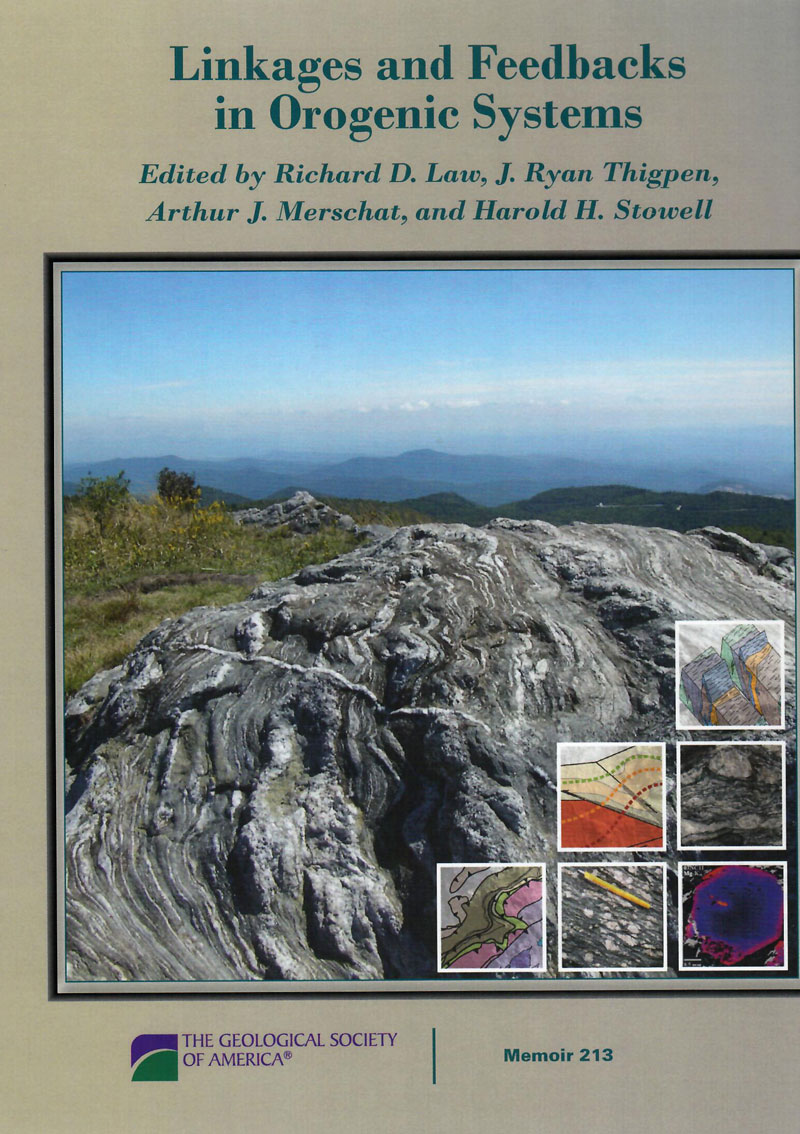
Memoir 213 - Linkages and Feedbacks in Orogenic Systems
Description:
Law, R. D., et.al. / Linkages and Feedbacks in Orogenic Systems, GSA Memoir 213, Boulder, 2017, cl, 372 pages, - 1 -, $ 25
Dedicated to Bob Hatcher, this Memoir explores linkages between tectonic processes through a series of field-, numerical- and laboratory-based studies, concentrating on feedback mechanisms within ancient and evolving orogens by which individual or linked tectonic processes may influence or predetermine the operation of other processes in space and time. Case studies cover a wide range of ancient to modern orogens: the Svecofennian of southern Finland, the Gyeonggi Massif of Korea, the Caledonides of northern Scotland, the Variscan of the East European craton, the Appalachians of the eastern United States, the European Alps and Dinarides, north Cascades of the northwestern United States, and the Himalaya. Emphasis is placed on integration between data sets developed from a wide range of analytical approaches, including: field mapping, seismic reflection profiling, strain analyses, petrology, isotopic dating, and numerical modeling-based studies of thermal evolution associated with tectonic processes such as thrust-related burial and exhumation.
Contents:
1. Evaluating kinematic displacement rate effects on transient thermal processes in thrust belts using coupled thermomechanical finite-element models
2. Techniques for understanding fold-and-thrust belt kinematics and thermal evolution
3. Basement-cover tectonics, structural inheritance, and deformation migration in the outer parts of orogenic belts: A view from the western Alps
4. Paleozoic tectonic evolution of the western Blue Ridge, southern Appalachians: A critical examination of long-standing conflicts in a polydeformed system
5. Strain gradients in the Day Mountain thrust sheet, Massachusetts, USA: Implications for deformation during thrusting and strain localization
6. Synconvergence extension and midcrustal exhumation in the Internal Dinarides
7. How (not) to recognize a midcrustal channel from outcrop patterns
8. Quartz inclusions in garnet: Time capsules of early mountain building
9. Paleoproterozoic to Triassic crustal evolution of the Gyeonggi Massif, Korea: Tectonic correlation with the North China craton
End of GSA Memoirs Catalog!
Click any link to continue.
Special Papers
Field Guides and Reviews of Engineering Geology
Our regular stock of older GSA Publications
GSA DNAG (Decade of North American Geology) Publications
Home Page
Catalogs on this Website
Mineral Specimens
Mineralogy Books
Select Mineral Books
Geology Books
U.S. State Geology
USGS Publications